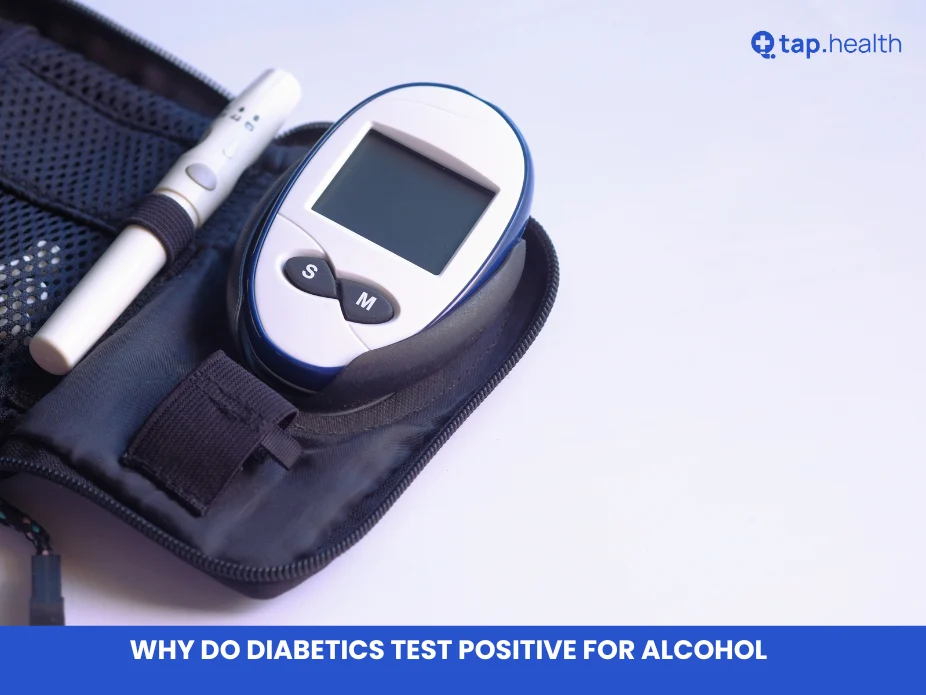Living with diabetes can sometimes be complicated. Diabetics often need to manage their blood sugar levels, which requires regular monitoring, medications, and lifestyle changes. But what happens when a diabetic person gets a surprising result from a routine test – like testing positive for alcohol? This can raise a lot of questions and confusion. In this blog, we’ll explore the reasons behind why diabetics might test positive for alcohol, even if they haven’t consumed any alcoholic beverages. We will also provide you with expert insights, real-life examples, and practical recommendations to manage this issue.
What Does it Mean to Test Positive for Alcohol?
When diabetics undergo routine testing, whether through a breathalyzer, urine test, or blood tests, alcohol may show up in their results, even though they haven’t consumed alcohol. So, why does this happen?
Possible Causes of Testing Positive for Alcohol
Several factors could contribute to this confusing scenario. Let’s take a look:
- High Blood Sugar and Ketones: One of the main reasons diabetics may test positive for alcohol is the production of ketones. When blood sugar levels are uncontrolled, the body burns fat instead of glucose for energy. This process creates ketones, which can sometimes be mistaken for alcohol by certain testing methods.
- Diabetic Ketoacidosis (DKA): In extreme cases, uncontrolled diabetes can lead to DKA, a condition where the body starts breaking down fat too quickly. This can lead to a buildup of acetone (a type of ketone) in the bloodstream, which can be detected as alcohol.
- Fermentation in the Gut: Another reason is fermentation in the gut. If a diabetic person has a high level of sugar in their gut, it may ferment into alcohol naturally. This could cause a test to show alcohol in their system, even without any consumption.
Real-Life Scenario:
Ravi’s Experience with False Alcohol Readings
Ravi, a 45-year-old diabetic living in Delhi, was taken aback when his breathalyzer test at a routine checkup showed a positive result for alcohol. He had not consumed any alcoholic drinks that day. After consulting his doctor, Ravi learned that his elevated blood sugar levels were causing his body to produce ketones, which could be misread as alcohol during a breath test. His doctor advised him to better manage his blood sugar levels to avoid these false readings.
The Science Behind Ketones and Alcohol Testing
Now that we’ve covered some potential causes of testing positive for alcohol, let’s dive deeper into the science. Ketones, which are produced when the body breaks down fat for energy, have a structure similar to alcohol molecules. This can make it difficult for certain testing equipment to differentiate between ketones and alcohol, leading to inaccurate readings.
What Happens in Diabetic Ketoacidosis?
In diabetic ketoacidosis (DKA), the body’s inability to use glucose for energy forces it to turn to fat. This process produces acetone, a type of ketone that is often detectable in the breath. Acetone can mimic the scent of alcohol, especially in breathalyzer tests.
Expert Contributions:
Dr. Shyam Sundar, an endocrinologist based in Mumbai, explains, “Diabetic ketoacidosis is a serious condition that can sometimes lead to confusion in test results. It’s crucial for diabetics to manage their blood sugar levels and be aware of their symptoms, such as fruity-smelling breath, which may indicate the presence of ketones.”
For more information on DKA and its connection to alcohol testing, you can visit this expert resource.
Managing False Positive Alcohol Results
If you are diabetic and have experienced a false positive alcohol test, here are some recommendations to help manage the situation:
1. Regular Blood Sugar Monitoring
Regularly monitoring your blood sugar levels is essential in managing diabetes. Uncontrolled blood sugar is often the primary culprit behind the production of ketones. Keeping your levels in check can reduce the likelihood of false alcohol readings. Consider using a continuous glucose monitor (CGM) to keep track of your levels throughout the day.
2. Stay Hydrated
Drinking plenty of water can help flush out excess ketones from your system and reduce the likelihood of them interfering with test results. Staying hydrated is key in diabetes management.
3. Seek Professional Advice
If you frequently experience issues with alcohol testing, it’s important to talk to your doctor. They may recommend adjusting your diabetes management plan, making dietary changes, or taking additional medications to help control blood sugar levels.
Recommendations Grounded in Proven Research
Studies have shown that controlling blood sugar levels can prevent the production of ketones. By staying consistent with diabetes management practices – such as taking medication as prescribed, exercising regularly, and eating a balanced diet – you can reduce the chances of falsely testing positive for alcohol.
A study published by the American Diabetes Association explains the link between elevated blood sugar, ketone production, and alcohol test results. You can refer to it for more in-depth research: American Diabetes Association – Ketones and Blood Sugar.
FAQ: Why Do Diabetics Test Positive for Alcohol?
Q1: Can high blood sugar cause false alcohol results?
Yes, high blood sugar levels can lead to the production of ketones, which may cause false positive alcohol readings in some tests.
Q2: What is diabetic ketoacidosis (DKA), and how does it relate to alcohol testing?
DKA occurs when the body starts breaking down fat for energy due to a lack of insulin, producing ketones like acetone that can mimic the scent of alcohol.
Q3: How can I prevent false positive alcohol results?
The best way to prevent false positives is by keeping your blood sugar levels under control, staying hydrated, and regularly monitoring your health.
Conclusion
Testing positive for alcohol, when you haven’t consumed any, can be confusing and concerning. However, understanding the underlying causes – such as high blood sugar and ketone production – can help you navigate this issue more confidently. If you’re diabetic, it’s crucial to keep your blood sugar levels in check and be aware of the conditions that could lead to false alcohol readings. By following a solid diabetes management plan, you can reduce the chances of these issues arising and ensure your test results are accurate.



